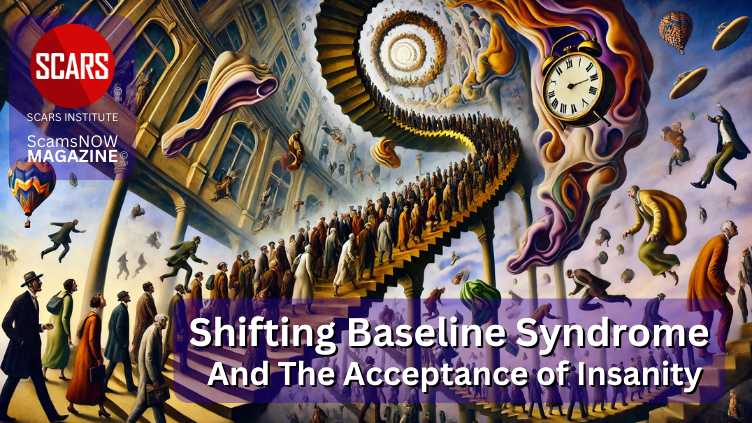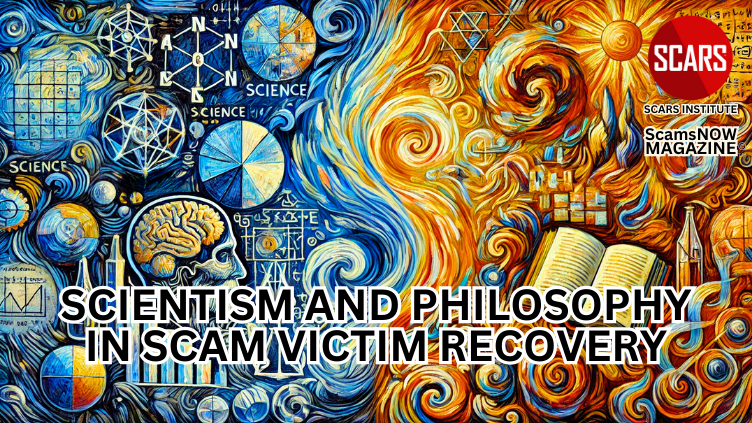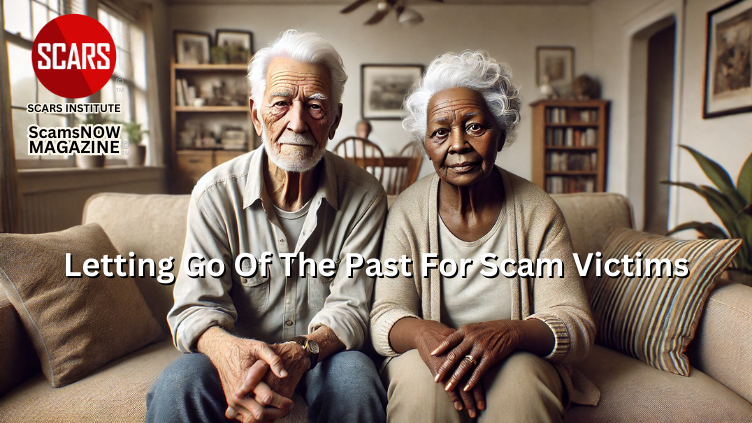Letting Go of the Past for Scam Victims
Letting Go of the Past: Moving Forward After Scam Recovery – Adapted from Jordan Petersons’ 5 Harsh Truths About Decluttering for Seniors
Primary Category: Scam Victim Recovery Psychology
Intended Audience: Scam Victims-Survivors / Family & Friends
Authors:
• Tim McGuinness, Ph.D. – Anthropologist, Scientist, Director of the Society of Citizens Against Relationship Scams Inc.
• Based and interpreted, in part, on the works of Jordan B. Peterson
About This Article
Letting go of the past after scam recovery is not about forgetting the experience but about releasing the emotional weight that keeps victims trapped in regret and self-recrimination. Recovery is a process that extends beyond financial restitution, requiring a conscious shift in mindset and a commitment to rebuilding life on a foundation of strength.
This journey involves five key pillars: prioritizing health, regaining financial stability, rediscovering purpose, developing resilience, and surrounding oneself with a supportive community. Reclaiming physical and mental well-being, taking back control of finances, and redefining personal meaning are essential steps toward moving forward. Resilience allows victims to see their experience as a lesson rather than a defining tragedy, while intentionally choosing positive relationships ensures a future unburdened by past mistakes. True healing comes not from clinging to what was lost but from embracing what is still possible.
Letting go is not about denying the past but about refusing to let it dictate the future. The power to move forward lies in recognizing that survival is just the beginning—thriving is the real goal.

Letting Go of the Past: Moving Forward After Scam Recovery
Adapted from Jordan Petersons’ 5 Harsh Truths About Decluttering for Seniors (see video below)
For those who have endured the emotional and financial devastation of being scammed, the road to recovery is not just about getting back what was lost—it’s about rebuilding a sense of self, reclaiming control, and ultimately, letting go. Letting go does not mean forgetting or dismissing what happened. Instead, it means releasing the weight of past pain and embracing a new chapter of life with clarity, purpose, and resilience.
The Reality of Moving On
When you’ve gone through the turmoil of a scam, the experience lingers long after the financial loss. The emotional scars remain, shaping how you see yourself, how you interact with the world, and what you believe about trust and vulnerability. Some survivors find themselves stuck, reliving the past in a loop of regret and self-recrimination. Others, however, manage to break free and step into a life no longer defined by what happened, but by what is still possible.
As you navigate this transition, you will likely face a hard truth: the support system you once relied upon may not be there in the way you expected. Friends and family may not fully understand your experience, and their reactions may range from dismissive to outright judgmental. This is where self-reliance, resilience, and the conscious decision to move forward become critical. No one can let go of the past for you; it is a decision you must make for yourself.
Rebuilding on a Foundation of Strength
There are five foundational pillars that can sustain scam victims as they transition from recovery to reclaiming their future. These pillars—health, financial stability, purpose, resilience, and community—are not handed to you. They must be cultivated with intention and maintained with diligence.
Step 1: Health: Rebuilding Your Body and Mind
The stress and trauma of being scammed take a significant toll on both mental and physical health. Anxiety, depression, insomnia, and even chronic illness can manifest as your body and mind struggle to process what happened. Now is the time to reclaim your well-being.
Start with movement. Engaging in physical activity, whether it’s walking, stretching, or swimming, is not just about fitness—it’s about reclaiming your autonomy. When your body is strong, your mind follows. A daily commitment to movement, even in small increments, restores confidence and stability.
Nutrition is another pillar of health. The stress of recovery can lead to poor eating habits, either neglecting nutrition altogether or indulging in comfort foods that offer only temporary relief. Prioritize whole foods, lean proteins, and nourishing meals that give your body the strength to heal.
And finally, there’s rest. Sleep is essential for emotional processing and cognitive clarity. If trauma-induced insomnia has taken hold, establish a nighttime routine that signals to your body it is safe to rest. Meditation, deep breathing, or simply turning off electronic distractions can make a profound difference.
Step 2: Financial Stability: Taking Back Control
One of the most devastating aspects of being scammed is the financial loss. Rebuilding your financial stability is about more than just money—it’s about regaining confidence in your ability to manage your resources and plan for the future.
If you are still recovering financially, start by creating a realistic and sustainable plan. Focus on rebuilding savings, reducing unnecessary expenses, and developing financial literacy to protect yourself from future risks. Learn to manage your finances in a way that fosters independence rather than fear.
Scammers often exploit a victim’s trust, but they also take away their sense of financial control. Taking charge of your finances, whether by budgeting, investing wisely, or even seeking financial counseling, is a way to reclaim that control and ensure that no one else can manipulate you again.
Step 3: Purpose: Defining Your Next Chapter
For many scam victims, their experience becomes an all-consuming part of their identity. But you are not just a victim—you are someone who survived, learned, and has the opportunity to build a new path forward.
Redefining purpose means letting go of the emotional weight of what happened and deciding how you want to live the rest of your life. It could mean pursuing an old passion, engaging in volunteer work, or even using your experience to educate others. Your past does not dictate your future; your actions do.
Purpose is not about erasing what happened, but about shifting focus from loss to growth. Ask yourself: What truly matters to me? What impact do I want to have? These questions will help guide you toward a life of meaning beyond the scam.
Step 4: Resilience: Strengthening Your Mindset
Letting go requires resilience. It requires the ability to acknowledge pain without letting it define you. Resilience is not about pretending everything is fine; it’s about facing difficulties head-on and choosing to move forward anyway.
Developing a resilient mindset starts with self-compassion. Many scam victims are hardest on themselves, blaming themselves for being deceived. But self-blame only keeps you tethered to the past. Instead, acknowledge that you were manipulated, that your intentions were good, and that this does not define your worth.
Perspective also plays a key role. Over time, you may come to see your experience as a lesson rather than a defining tragedy. Every difficulty in life presents an opportunity for growth—if you are willing to see it that way.
Step 5: Community: Choosing the Right People
Not everyone will understand your journey, and not everyone deserves a place in your life after recovery. One of the hardest but most necessary steps in moving on is curating your community intentionally.
Surround yourself with people who uplift you, who respect your growth, and who do not define you by your past mistakes. Toxic relationships—those that fuel your insecurities or remind you constantly of what you’ve lost—only keep you trapped in the past.
Seek out connections that reinforce your present and future. This may mean joining support groups, reconnecting with old friends, or even forming new relationships through shared interests and goals. True healing happens in an environment of acceptance and encouragement.
The Power of Letting Go
At some point, you must decide whether you will continue carrying the weight of what happened or if you will set it down and walk forward. Letting go is not about dismissing your experience—it is about refusing to let it control you any longer.
Letting go means making peace with the past without being imprisoned by it. It means embracing the unknown future with open arms rather than clinging to what can no longer be changed. It is a decision, a practice, and ultimately, a form of freedom.
As you step forward, remember this: you are not defined by what happened to you. You are defined by what you choose to do next. The past is a place of learning, not a place of living. Choose to live.
-/ 30 /-
What do you think about this?
Please share your thoughts in a comment below!
Statement About Victim Blaming
SCARS Institute articles examine different aspects of the scam victim experience, as well as those who may have been secondary victims. This work focuses on understanding victimization through the science of victimology, including common psychological and behavioral responses. The purpose is to help victims and survivors understand why these crimes occurred, reduce shame and self-blame, strengthen recovery programs and victim opportunities, and lower the risk of future victimization.
At times, these discussions may sound uncomfortable, overwhelming, or may be mistaken for blame. They are not. Scam victims are never blamed. Our goal is to explain the mechanisms of deception and the human responses that scammers exploit, and the processes that occur after the scam ends, so victims can better understand what happened to them and why it felt convincing at the time, and what the path looks like going forward.
Articles that address the psychology, neurology, physiology, and other characteristics of scams and the victim experience recognize that all people share cognitive and emotional traits that can be manipulated under the right conditions. These characteristics are not flaws. They are normal human functions that criminals deliberately exploit. Victims typically have little awareness of these mechanisms while a scam is unfolding and a very limited ability to control them. Awareness often comes only after the harm has occurred.
By explaining these processes, these articles help victims make sense of their experiences, understand common post-scam reactions, and identify ways to protect themselves moving forward. This knowledge supports recovery by replacing confusion and self-blame with clarity, context, and self-compassion.
Additional educational material on these topics is available at ScamPsychology.org – ScamsNOW.com and other SCARS Institute websites.
-/ 30 /-
What do you think about this?
Please share your thoughts in a comment below!
One Comment
Leave A Comment
Important Information for New Scam Victims
- Please visit www.ScamVictimsSupport.org – a SCARS Website for New Scam Victims & Sextortion Victims.
- SCARS Institute now offers its free, safe, and private Scam Survivor’s Support Community at www.SCARScommunity.org – this is not on a social media platform, it is our own safe & secure platform created by the SCARS Institute especially for scam victims & survivors.
- SCARS Institute now offers a free recovery learning program at www.SCARSeducation.org.
- Please visit www.ScamPsychology.org – to more fully understand the psychological concepts involved in scams and scam victim recovery.
If you are looking for local trauma counselors, please visit counseling.AgainstScams.org
If you need to speak with someone now, you can dial 988 or find phone numbers for crisis hotlines all around the world here: www.opencounseling.com/suicide-hotlines
Statement About Victim Blaming
Some of our articles discuss various aspects of victims. This is both about better understanding victims (the science of victimology) and their behaviors and psychology. This helps us to educate victims/survivors about why these crimes happened and not to blame themselves, better develop recovery programs, and help victims avoid scams in the future. At times, this may sound like blaming the victim, but it does not blame scam victims; we are simply explaining the hows and whys of the experience victims have.
These articles, about the Psychology of Scams or Victim Psychology – meaning that all humans have psychological or cognitive characteristics in common that can either be exploited or work against us – help us all to understand the unique challenges victims face before, during, and after scams, fraud, or cybercrimes. These sometimes talk about some of the vulnerabilities the scammers exploit. Victims rarely have control of them or are even aware of them, until something like a scam happens, and then they can learn how their mind works and how to overcome these mechanisms.
Articles like these help victims and others understand these processes and how to help prevent them from being exploited again or to help them recover more easily by understanding their post-scam behaviors. Learn more about the Psychology of Scams at www.ScamPsychology.org
SCARS INSTITUTE RESOURCES:
If You Have Been Victimized By A Scam Or Cybercrime
♦ If you are a victim of scams, go to www.ScamVictimsSupport.org for real knowledge and help
♦ SCARS Institute now offers its free, safe, and private Scam Survivor’s Support Community at www.SCARScommunity.org/register – this is not on a social media platform, it is our own safe & secure platform created by the SCARS Institute especially for scam victims & survivors.
♦ Enroll in SCARS Scam Survivor’s School now at www.SCARSeducation.org
♦ To report criminals, visit https://reporting.AgainstScams.org – we will NEVER give your data to money recovery companies like some do!
♦ Follow us and find our podcasts, webinars, and helpful videos on YouTube: https://www.youtube.com/@RomancescamsNowcom
♦ Learn about the Psychology of Scams at www.ScamPsychology.org
♦ Dig deeper into the reality of scams, fraud, and cybercrime at www.ScamsNOW.com and www.RomanceScamsNOW.com
♦ Scam Survivor’s Stories: www.ScamSurvivorStories.org
♦ For Scam Victim Advocates visit www.ScamVictimsAdvocates.org
♦ See more scammer photos on www.ScammerPhotos.com
You can also find the SCARS Institute’s knowledge and information on Facebook, Instagram, X, LinkedIn, and TruthSocial
Psychology Disclaimer:
All articles about psychology and the human brain on this website are for information & education only
The information provided in this and other SCARS articles are intended for educational and self-help purposes only and should not be construed as a substitute for professional therapy or counseling.
Note about Mindfulness: Mindfulness practices have the potential to create psychological distress for some individuals. Please consult a mental health professional or experienced meditation instructor for guidance should you encounter difficulties.
While any self-help techniques outlined herein may be beneficial for scam victims seeking to recover from their experience and move towards recovery, it is important to consult with a qualified mental health professional before initiating any course of action. Each individual’s experience and needs are unique, and what works for one person may not be suitable for another.
Additionally, any approach may not be appropriate for individuals with certain pre-existing mental health conditions or trauma histories. It is advisable to seek guidance from a licensed therapist or counselor who can provide personalized support, guidance, and treatment tailored to your specific needs.
If you are experiencing significant distress or emotional difficulties related to a scam or other traumatic event, please consult your doctor or mental health provider for appropriate care and support.
Also read our SCARS Institute Statement about Professional Care for Scam Victims – click here
If you are in crisis, feeling desperate, or in despair, please call 988 or your local crisis hotline – international numbers here.
More ScamsNOW.com Articles
A Question of Trust
At the SCARS Institute, we invite you to do your own research on the topics we speak about and publish. Our team investigates the subject being discussed, especially when it comes to understanding the scam victims-survivors’ experience. You can do Google searches, but in many cases, you will have to wade through scientific papers and studies. However, remember that biases and perspectives matter and influence the outcome. Regardless, we encourage you to explore these topics as thoroughly as you can for your own awareness.















![NavyLogo@4x-81[1] Letting Go of the Past for Scam Victims - Adapted from Jordan Petersons' 5 Steps for Seniors - 2025](https://scamsnow.com/wp-content/uploads/2025/04/NavyLogo@4x-811.png)









![scars-institute[1] Letting Go of the Past for Scam Victims - Adapted from Jordan Petersons' 5 Steps for Seniors - 2025](https://scamsnow.com/wp-content/uploads/2025/04/scars-institute1.png)

![niprc1.png1_-150×1501-1[1] Letting Go of the Past for Scam Victims - Adapted from Jordan Petersons' 5 Steps for Seniors - 2025](https://scamsnow.com/wp-content/uploads/2025/04/niprc1.png1_-150x1501-11.webp)
This article is one of the best I have read so far. It is full of hope, in my opinion, if we choose to follow the steps into recovery and after recovery from the awful experience of being scammed. Choosing ourselves is key now. What happened to us, victims, was a lesson, not a definition of ourselves. Now that we are equipped with knowledge and wisdom, we can look forward for a better version of ourselves and to make better decisions.